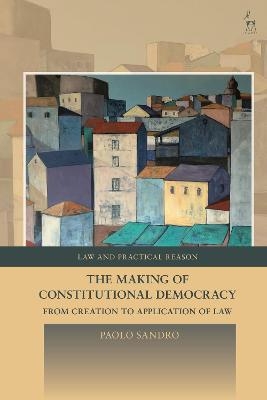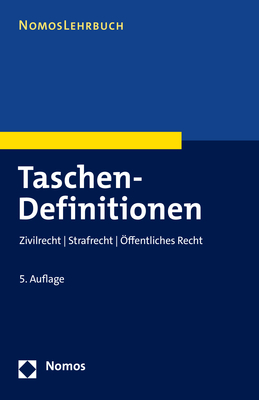
The Making of Constitutional Democracy
Hart Publishing (Verlag)
978-1-5099-0522-5 (ISBN)
The book considers the relevance of distinguishing between law-creation and law-application and how this transcends the boundaries of jurisprudential enquiry. It argues that such a distinction is also a crucial component of political theory. For if there is no possibility of applying a legal rule that was created by a different institution at a previous moment in time, then our current constitutional-democratic frameworks are effectively empty vessels that conceal a power relationship between public authorities and citizens that is very different from the one on which constitutional democracy is grounded.
After problematising the most relevant objections in the literature, the book presents a comprehensive defence of the distinction between creation and application of law within the structure of constitutional democracy. It does so through an integrated jurisprudential methodology, which combines insights from different disciplines (including history, anthropology, political science, philosophy of language, and philosophy of action) while also casting new light on long-standing issues in public law, such as the role of legal discretion in the law-making process and the scope of the separation of powers doctrine.
The ebook editions of this book are available open access under a CC BY-NC-ND 4.0 licence on bloomsburycollections.com.
Paolo Sandro is Lecturer in Law at the University of Leeds, UK.
I. Aims and Structure of the Work
1. Law, Power, and Political Authority. On the Scope and Limitations of the Work
I. Introduction
II. Brief Methodological Remarks
III. The Province of the Problem Determined: What is Law?
IV. Politics, Political Power, Political Authority
V. From Powers to Power. The Familiar Tale of the Ineluctability of the State
A. And its Two-pronged Critique: Isonomia and ‘Early’ States
VI. The Conditions of Existence of Political Authority: Insights from the Theory of Normative Orders
2. The Dependence of Constitutional Democracy on the Distinction between Creation and Application of Law
I. Introduction
II. The Contested Relationship between Law and Politics
III. Law as lex and as ius: The Duality that Makes Constitutionalism Possible
IV. From Constitutions to Constitutionalism: Narrowing the Focus of Constitutional Theory
V. The (Proverbial) Tension between Democracy and Constitutionalism
VI. Modern Constitutionalism as ‘Legal Otherness’
VII. The Two-fold Justificatory Dependence of Constitutional Democracy on the Idea of Application of Law
3. A Critical Evaluation of Moderate Legal Realism
I. Introduction
II. Realism vs Formalism
III. Let Us be Realist about Adjudication. What do Judges Eat for Breakfast?
IV. Realism and Realisms in Law: Meta-theory
V. The Lowest Common Denominator of Legal Realism
VI. The Two Axes of Rule-scepticism
A. Radical-immanent Indeterminacy Thesis
B. Radical-transcendental Indeterminacy Thesis
C. Moderate-immanent Indeterminacy Thesis
D. Moderate-transcendental Indeterminacy Thesis
VII. The Unbearable Lightness of Moderate Scepticism 0
VIII. On the Normativity of Law, and On the Digestion of Judges
4. Towards a Unified Account of Discretion in Law
I. Introduction
II. HLA Hart and the Concept of Discretion. Back to the Future?
III. Dworkin and the (Normative) No-Strong-Discretion Thesis
IV. Discretion as a Pervasive Feature of Kelsen’s Stufenbaulehre
V. Discretion as Balancing in Klatt (and Alexy)
VI. The History of Discretion in the Administrative Domain
VII. Administrative Discretion in Germany
VIII. Discretion in the French-Italian Administrative Tradition
IX. The Concept of Discretion in English Administrative Law
X. Towards a Unifi ed Account of Discretion in Law
A. Normative Discretion
B. Interpretive Discretion
XI. Conclusion
5. Law and Language and as Language. An Alternative Picture of a Multifaceted Relationship
I. Introduction
II. The Communicative Model of Law. A Two-way Affair?
III. Beyond ‘What is Said’. Speech-act Theory and the Rise of Pragmatics in Legal Interpretation
IV. First Objection: Law as Language, Law and Language(s)
V. Second Objection: Speech-act vs Text-act Theory
VI. Legal Texts as ‘Autonomous’ Text-acts
VII. An Alternative Theory of Legal Meaning: Semantic Minimalism
VIII. Prolegomena to a Theory of Legal Interpretation
IX. Conclusion
6. Creation and Application of Law. An Analytical Distinction
I. Introduction
II. The Two Extremes: Rejecting vs Assuming the Distinction
III. Kelsen on the Relativity of the Distinction between Creation and Application of Law
IV. Creation of Law: Of the Typicality of Legal Rules
V. The Principle of Legality as a (Semantic) Meta-norm on Law-creation and Law-application
VI. Unpacking the Idea of ‘Application of Law’
VII. The Potential Asymmetry between Norm-following and Norm-application
VIII. On the (Different) Normativity of Power-conferring Norms
IX. Can only Officials Apply the Law?
X. Form and Substance. Towards an Analytical Account of Law-application
XI. Conclusion
XII. PS One Final Objection: Interpretation, Interpretation, Interpretation!
7. The Separation of Powers. A Meta-theoretical Reassessment
I. Introduction
II. Genealogical Issues. When was the Separation of Powers ‘Invented’?
III. A Twofold Meta-theoretical Ambiguity Plaguing the Discussion
IV. The Justificatory Debate. Monism vs Pluralism
V. Critical Approaches
VI. The Separation of Powers as a Formal Theory and as a Normative Doctrine. On the Advantages of Maintaining a Strict Distinction
A. The Formal Theory of the Separation or Division of Powers
B. A Normative Doctrine of the Organisation of Political Power Based on the Distinction between Law-creation
and Law-application
VII. Conclusion
| Erscheinungsdatum | 04.02.2019 |
|---|---|
| Reihe/Serie | Law and Practical Reason |
| Verlagsort | Oxford |
| Sprache | englisch |
| Maße | 156 x 234 mm |
| Gewicht | 640 g |
| Themenwelt | Recht / Steuern ► Allgemeines / Lexika |
| Recht / Steuern ► EU / Internationales Recht | |
| Recht / Steuern ► Öffentliches Recht | |
| ISBN-10 | 1-5099-0522-7 / 1509905227 |
| ISBN-13 | 978-1-5099-0522-5 / 9781509905225 |
| Zustand | Neuware |
| Haben Sie eine Frage zum Produkt? |
aus dem Bereich


